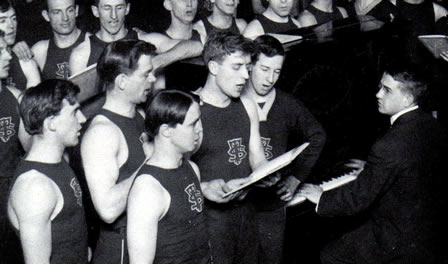"Serious sport has nothing to do with fair play…it is war minus the shooting."
Muscular Christianity: Manhood and Sports in Protestant America
Return to the book list for this category.
1880-1920 Clifford Putney, Harvard University Press, 2001. ISBN 0-674-00634-8
The book documents the development of the Muscular Christianity movement in the USA. The author begins with his summary of Muscular Christianity and its origins in England.
He attributes the spread of Muscular Christianity in the US at end of 19th century to the "decline in evangelical antipathy towards sports, the adoption by most YMCAs of athletic programs, and the invention by YMCA men of 'character-building' sports such as basketball and volleyball". [Page 3]
He argues that Muscular Christianity in the USA was at its peak 1880-1920 before pacifism, cynicism and church decline caused it to lose influence.
He quotes the Cambridge Seven as an example of missionary organisations seeing the value of sport in evangelizing foreigners. In reality only 2 or 3 of the Cambridge Seven were sporty.
He notes the irony that the YMCA, founded in the UK and exported to the USA, only became sporty in the UK through American influence! He argues the American suspicion of sport can be traced back to the Puritan negative view of sport and play which lingered to become one of the causes of modern America's obsession with work. [Page 20]
He finds a quote from 1869 that seems well ahead of its time: "Every village that has two churches now should put both congregations together to worship in one building and to practice gymnastics in the other" [Page 22 (Source: Moses Coit Tyler, The Brownville papers, Boston 1869, P20)]
He finds evidence [Page 24] that gardening was OK but not sport and also a series of articles in the Wheelman, all written in 1882 by clergymen on the subject of clergy and cycling "congratulating ministers for their courage in cycling while chastening their backward congregations for thinking such doings 'unseemly'" [Page 59] and a 1915 quote that "The risen Jesus is a member of every gymnasium class, of every athletic team in which there are Christians, whether we are conscious of it or not". [Page 71]
Another role of the Muscular Christianity movement was to reverse the trend towards women greatly outnumbering men in churches and the suggestion that American churches were becoming so feminized that there would not be enough men to sing bass in heaven. [Page 74] The strategy was to present a masculine and manly Jesus that Protestant America could admire. [Page 98]
There is an interesting discussion of how American missionaries spread Western sports along with the gospel. The YMCA played an important role too as it spread from country to country showing "why healthy bodies were loved by God",[ Page 132] which all "redounded obviously to the glory of sport and fitness". [Page 133]
The influence of the Studd brothers, "JEK Studd, an English evangelist and world-renowned cricketeer who toured American campuses during the winter of 1886 at the behest of the YMCA. Studd frequently preached on 'vital Christianity' and often made mention of his famous brother, CT Studd, whose group, the Cambridge Seven (seven athletes turned missionaries), were at that time evangelizing hundreds in China". [Page 134]
Leaving aside the question of what a "cricketeer" is, JEK Studd was not a world-renowned cricketer - because he was not that good and in any case cricket was really only played in Australia and England at that time. The error regarding all the Cambridge Seven being athletes is repeated.
The book is really only of interest to those who want to document the development of Muscular Christianity in the USA at the end of the 19th century. It is not a must-read book for the student of sports ministry.

